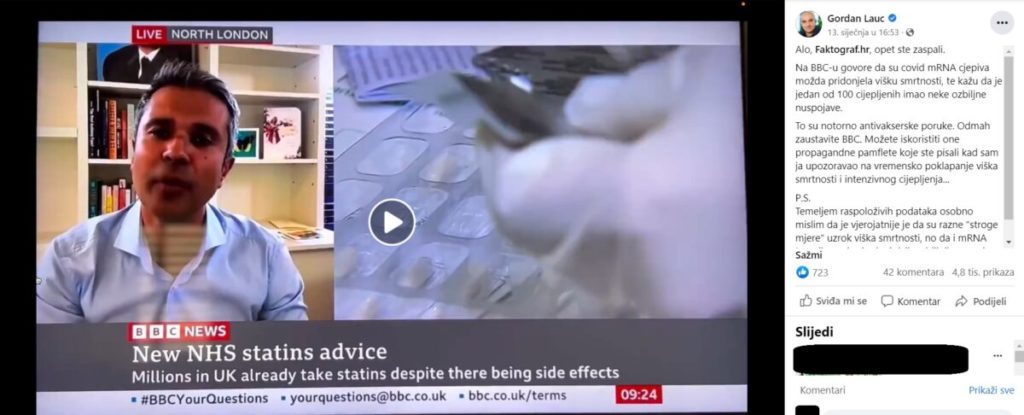Original article (in Croatian) was published on 23/01/2023
Malhotra was invited to the BBC program to talk about cholesterol-lowering drugs, but he used the space to spread disinformation.
Molecular biologist Gordan Lauc, in a status posted on his Facebook profile on January 13, invited Faktograf to investigate the allegations from Dr. Aseem Malhotra’s interview for the British public service BBC.
“Hello, Faktograf.hr, you fell asleep again. They say on the BBC that covid mRNA vaccines may have contributed to excess mortality, and they say that one in 100 vaccinated had some serious side effects.
These are notoriously anti-vaxxer messages. Stop the BBC now. You can use those propaganda pamphlets you wrote when I warned about the timing of excess mortality and intensive vaccination…
The clip in the status was viewed 4,8 thousand times, and the comment section collected 42 comments and 723 other reactions.

During the pandemic, Faktograf dealt with the unfounded claims made by Gordan Lauc on several occasions.
The BBC apologized for the interview
In an interview that was criticized by the scientific community on the same day, and the BBC apologized for it in a statement on January 19, Malhotra connected the so-called “excess deaths” in Great Britain with the vaccine against the disease Covid-19.
Malhotra was invited to the BBC to talk about the recommendations of the British medical institutions (NHS and NICE) about a group of drugs that reduce blood cholesterol – statins. However, without the host asking him anything about the reasons for the “excess death” and the vaccine against Covid-19, he turned the topic of the conversation in that direction and thereby provoked a reaction from the scientific community.
Malhotra himself switched the topic to excess mortality and vaccines
At the beginning of the conversation, the presenter introduced Malhotra as a cardiologist specializing in statins and asked what he thought about the published recommendations on these drugs. However, after devoting the beginning of the answer to that question, he switched the topic to “excess deaths” in Great Britain and linked it to vaccines against Covid-19.
“One of the reasons why this (recommendations on statins) has become news right now is the great concern about ‘excess deaths’”, Malhotra said, adding that the British organization that funds research into cardiovascular diseases, the British Heart Foundation (BHF), recently announced that, according to him, “30 thousand more deaths related to cardiovascular diseases were recorded during the pandemic”.
“What is almost certain is, if you will allow me to say so, what I have established through my research. A likely contributing factor is that mRNA vaccines ‘carry’ cardiovascular risk and I have asked for a suspension (of vaccinations) until the end of the investigation because there is currently a lot of uncertainty about what is causing the excess deaths”, Malhotra said and then shared and that the probable cause of his father’s death, although he stated that it took half an hour for the ambulance to get to him when he had a heart attack, “was two doses of the Pfizer vaccine that he received six months earlier”.
Then the presenter stopped him and asked if there is a medically proven connection between the risk of cardiovascular diseases and the vaccine against Covid-19, and he answered that there is. He then presented the information that recent studies show that in the “original research” of vaccine manufacturers Pfizer and Moderna, it was shown that “the risk of serious events is at least one in 100” and that much of this is related to the risks of cardiovascular diseases. “I think that vaccines have certainly helped people at high risk, but now that we have concluded that micron is not worse than the flu, it is really time to stop vaccinations and research this problem”, Malhotra said at the end of the video shared by Lauc on Facebook.
BBC: Myocarditis more likely to be caused by Covid-19 than vaccines
In its apology and explanation, the BBC wrote that Malhotra, as a cardiologist, had been invited to the show to talk about the new National Institute for Health and Care Excellence (NICE) recommendations on statins. “During the interview, without prompting, that is, on his own, he mentioned the excess mortality among people with heart disease and made statements about mRNA vaccines. We agree that we should have been better prepared to challenge what he said, given his earlier comments about vaccination, and we are sorry that this happened”, BBC wrote in a statement, adding that they published on their website a press release explaining his claims, and on the same morning they interviewed another expert, Professor Peter Openshaw from Imperial College London, who commented on Malhotra’s allegations.
In the explanation, the BBC states that the BHF (British Heart Foundation) stated that “Covid-19 infections are probably an important factor in the excess deaths related to cardiovascular diseases during the first year of the pandemic” and that “a wide-scale disruption in the treatment of heart patients had an impact on a larger number deaths from cardiovascular disease in England”. “They also said that while there have been rare cases of myocarditis following vaccination with the Moderna and Pfizer vaccines, overall, those vaccines are unlikely to cause more cases of myocarditis compared to other vaccines. They state that the disease of Covid-19 is much more likely to cause myocarditis than the vaccine and that those vaccinated have a much lower risk of getting more severe complications caused by the disease of Covid-19”, the BBC explains.
Professor Peter Openshaw, a member of the British Vaccine Network (UK Vaccine Network) explained on the same morning’s show that a small number of cases of myocarditis have been reported after vaccination against Covid-19 and that the risk of complications that have been reported after the disease of Covid-19 is “probably 100 times greater or more”. “We apologize for not being better prepared to refute Malhotra’s allegations during the interview”, the BBC wrote.
The BHF does not mention vaccines in its report
The latest BHF report, cited by Malhotra, states that between March 2020 and August 2022, there were more than “30,000 more deaths involving ischemic heart disease”, which is the most common type of heart disease in England. This is 14 percent more than expected before the pandemic.
“Covid-19 is probably a significant factor in excess mortality from cardiovascular diseases during the first year of the pandemic”, the report states. The excess deaths from cardiovascular diseases after the first year of the pandemic are mostly “blamed” on external factors such as the inability of the British health system to adequately treat all patients. In the entire report, not once does the excess death rate from cardiovascular disease in England relate to the Covid-19 vaccine, as Malhotra claimed.
Malhotra has made unsubstantiated claims about vaccines before
Faktograf dealt with the unfounded allegations of Dr. Aseem Malhotra on two previous occasions (1, 2). When he mentions “his research” in an interview with the BBC, he probably refers to his article, which was published in two parts at the end of September 2022.
Faktograf wrote in detail about the problematic nature of the allegations in that article in October, and numerous scientists and fact-checking web portals, such as Health Feedback, AFP Fact Check, as well as doctors and scientists such as Dr. Susan Oliver, who published a video about Malhotra’s article (archived here) on her YouTube channel Back to the Science, and Dr. David Gorski.
The key findings from all these analyzes are that Malhotra based his two-part article on dubious evidence, choosing those sources that confirm his thesis (cherry picking), ignoring those that contradict his thesis, and anecdotal evidence, as well as anonymous sources and even blog posts.
As we have already written, Dr. Malhotra is quite well-known in his homeland, but he did not become famous primarily as a cardiologist, but as a public communicator and promoter of healthy eating. Dr. Malhotra has been called out on several occasions for making claims that have no basis in facts. His “Pioppi Diet” was listed by the British Dietetic Association as “one of the five worst celebrity-promoted diets of 2018”. He claimed that statins, popular cholesterol-lowering drugs, actually contribute to heart disease (although such a claim has no basis in science). During the Covid-19 pandemic, Malhotra published the book “21-day Immunity plan”, which he promoted with the unfounded claim that the diet he recommends can reduce the risk of the virus.



